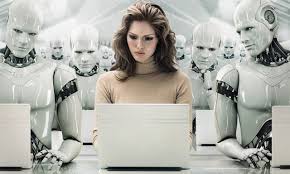
In recent years, a great deal has been written about the threat of automation.
With wages declining, unemployment rising, and increasing inequality, there’s a warranted fear surrounding the rapid growth of artificial intelligence and automation.
Today it’s no longer just the Silicon Valley trend watchers and techno-prophets who are concerned.
In a study that has already collected hundreds of citations, scholars at Oxford University have estimated that no less than 47% of all American jobs and 54% of those in Europe are at great risk of being replaced with machines.
But, we’re not talking a century down the line. We’re talking within the next 20 years. “The only real difference between enthusiasts and skeptics is a time frame,” notes a New York University professor. “But a century from now, nobody will much care about how long it took, only what happened next.”
We’ve heard this song and dance before, so the aforementioned won’t likely take you by surprise. The rise of automation has had blue-collar workers fearing job safety for over 200 years!
Case in point, farming. In the year 1800, about 74% of all Americans were farmers, by the year 1900, this number decreased by 31%, and by the year 2000, it was down to a mere 3%. However, this slow integration of machinery into the farming industry never led to rapid mass unemployment. In 1930, the famous economist John Maynard Keynes predicted that people would have a 15-hour workweek by the year 2030, even though the number of hours in the average workweek has only risen since the 1980s.

Perhaps, rather than vetting the effect of automation in the work field, the real question should be WHAT constitutes the definition of “work” in today’s world?
What is “work” anyway?
In a 2013 survey of 12,000 professionals conducted by the Harvard Business Review, 50% of those studied polled reported having felt that their job had “no meaning and significance”, and an equal number were unable to relate to the mission of the company they worked for. In another poll, among 230,000 employees in 142 countries, results showed that only 13% of workers actually “liked” their job. Whereas, in a recent survey among Brits, 37% think that their job is utterly useless.
These jobs are what anthropologist David Graeber refers to as “bullshit jobs”.
The type of job that looks good on paper but yields nothing more than a well-rounded LinkedIn and hours of complaining once the workday concludes.
It is important to note, however, that these “bullshit jobs” do not include sanitation workers, teachers, and the nurses of the world. There would be an instant state of emergency if these people were to go on strike.
The “bullshit” jobs also exclude the growing masses of consultants, bankers, tax advisors, managers, and others who earn their money in strategic trans-sector peer-to-peer meetings to brainstorm the value and co-creation in the network society.
The question is, will there be enough jobs for people in a few decades?
Anyone that fears an event of mass unemployment is underestimating capitalism’s incredible ability to generate new “bullshit jobs”. If we really want to benefit from the rewards of major technological advances made in recent decades and the advancement of robots, then we need to radically rethink our definition of “work”.
The Paradox of progress
It starts with an age-old question: what is the meaning of life? Most people would throw out things that aren’t generally quantifiable. “To make the world brighter, more beautiful, and interesting.” But how is this achieved? If you answered “through work”, then you’re not alone.
What is work?
Our definition of work is actually quite narrow. Only the work that generates money is allowed to be counted toward GDP. Because of this, it’s no surprise that we have organized education around feeding as many people as possible in small portions of flexible positions into the workforce. However, what happens when a growing proportion of people deemed successful by the measures of our knowledge economy feel that the work they do is pointless? This is one of the biggest taboos of our time. Our whole basis of finding meaning could dissolve into thin air.
Ironically, technological progress is the only thing exacerbating this crisis. In the past, society has been able to afford more “bullshit jobs,” specifically because of our robots continuing to improve. As farms and factories became more efficient, their share of the economy decreased. The more productive agriculture and manufacturing became, the fewer people were employed in those industries. Let’s call it the paradox of progress: the wealthier we become, the more room we have to waste our time. It’s like Brad Pitt says in Fight Club: too often, we’re “working jobs we hate so we can buy shit we don’t need.”
Rather than avoiding or debating the topic, perhaps it is best to ask ourselves one question. What would our economy look like if we were to radically redefine the definition of “work”? I truly believe that a universal basic income is the most effective answer to the issue of advancements in robotization. This is not because robots are going to take over our jobs, it is because a basic income would give everybody the chance to do something they feel is meaningful.
I believe in a future where the value of your work is not defined by the size of your paycheck but rather, by the amount of happiness you spread and the amount of meaning you put into your work. I believe in a future where the purpose of education is not to prepare you for another meaningless job but for a life well lived. I believe in a future where “jobs are for robots and life is for people.”
If basic income sounds like Utopia to you, then let me remind you that in every milestone of our civilization – from the end of slavery to democracy to equal rights for men and women – there was once a Utopian fantasy as well. As Oscar Wilde wrote long ago: “Progress is the realization of Utopias.”
If you found this article interesting, please share it with friends and family by clicking the button below!




